The treadmill’s a bore. The gym – sorry, fitness center – is ugly. The challenge of solving a complex creative problem is much more satisfying than spending time jogging.
For these and other reasons, gifted, talented and creative people often find it hard to raise enthusiasm for exercise. Yet we are precisely the group that benefits the most from it. Here’s why:
Creative benefits of exercise
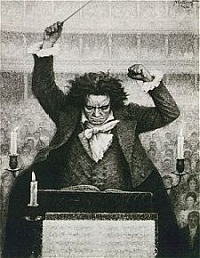
"If it weren't for my workouts I could never have composed nor conducted my third symphony: 'The Aerobica'."
Gifted individuals live intensely and can benefit from the short term exercise benefits of increased energy, attention and focus. After aerobic exercise, we feel more present in our bodies and are able to add greater value and vitality to each moment.
Those gifted individuals who find themselves spinning between different demands will find a regular exercise period provides both stability – a centering event – and a stimulus.
While physically anchored in aerobic activity your mind is opened to new possibilities. You can surrender to what feels like the indulgence of free-floating thoughts, unrestrained by messages that you should be doing something more ‘useful’.
Aerobic exercise also delivers long-term benefits in the form of improved brain function. The increase in blood flow “appears to carry various growth factors from the periphery of the body into the brain to start a molecular cascade there, creating new neurons and brain connections”, says Henriette van Praag, an investigator in the Laboratory of Neurosciences at the National Institute on Aging.
Less stress = more creativity
Exercise reduces the negative effects of stress.
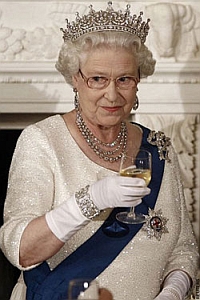
"Exercise? Creativity? For some of us, life can be stress-free without either."
Stress stops creativity dead in its tracks. Without access to that creativity, gifted individuals can feel bereft, abandoned and lost.
Many – particularly those who demonstrate their creativity through entrepreneurial activity – are highly adept at concealing this sense of loss. They turn their minds to other things. Perhaps too many other things. And their loss of a deeper commitment may go unnoticed because they are so competent that even the ‘busy work” they undertake can look pretty serious.
It’s only at the end of the day, with energies naturally lowered, that they reach for an extra glass of wine or similar comfort in an attempt to fill the incipient emptiness they experience within their lives.
So a reduction in negative stress is essential to experiencing a fully creative life.
Boost that norepinephrine
There is a popular theory that exercise creates a “runner’s high” by releasing a rush of endorphins but the American Psychological Association disputes this.
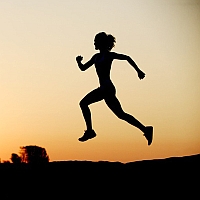
"Freedom's just another word for exercise-increased norepinephrine."
The APA suggests that exercise increases brain concentrations of the neuromodulator norepinephrine, which may help the brain deal with stress more efficiently.
Psychologists don’t think it’s a simple matter of more norepinephrine equals less stress and anxiety. Instead, they think exercise works by enhancing the body’s ability to respond to stress.
Biologically, exercise seems to give the body a chance to practice dealing with stress. It forces the body’s physiological systems – all of which are involved in the stress response – to communicate much more closely than usual.
So the cardiovascular system communicates with the renal system, which communicates with the muscular system. And all of these are controlled by the central and sympathetic nervous systems, which also must communicate with each other.
This workout of the body’s communication system is part of the deeper value of exercise. Remember: the more sedentary we are, the less efficient our bodies become in responding to stress.
So now you know why, what are you going to do?
You’re half-convinced, but the treadmill is still boring and the dogs chase you when you jog down the road. How do you take the next step?
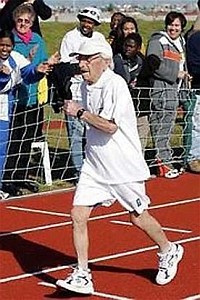
Philip Rabinowitz of S. Africa, age 102, the fastest 100-year-old to ever run the 100 meters (30.86 seconds).
Here’s how to start:
- Embrace the idea. Fully understand that regular exercise (six workouts a week, a mixture of aerobic, strength-building and flexibility) is much better for you and your performance than the alternative. Remember, if you and another person are identical in potential, the one who exercises will be the one who achieves more.
- Acknowledge your resistance. It’s very hard to start an exercise program from scratch. It needs lots of personal drive and external support. Admit that it’s hard but that you want to do it anyway. And start small. When I started jogging it took me longer to “run” a mile than to walk it. But it gave me plenty of time to enjoy being outside, increasing my awareness and – bliss! – allowing my thoughts to travel where they will.
- Pick a larger goal than exercising just to be fit. Few of us can crank out the miles on an exercise bike just so’s we can be back doing the same thing tomorrow. So we need to look beyond the task to a larger reward. Pick a sport and decide to compete at your age level. Or surrender to the joy of dance and seek to excel. By participating you expand your social group – and thus develop your intellectual and emotional domains – as well as developing your body.
- Pick something impossibly hard. You’re gifted so you simply must challenge yourself. Don’t allow your rational self to convince you it (whatever it is) can’t be done. If it’s truly beyond you, find out by failing at it rather than by predicting failure from the comfort of your favorite web-surfing armchair. Select your exercise activity for its complexity and limitless scope for improvement.
- Blow notions of age and physical limitation out of the window. We’re not all going to emulate Philip Rabinowitz (see picture above) but we can certainly set our own anti-aging records.
Don’t confuse exercise with pastime
Many of us claim not to have time for exercise but spend hours each day on what I would term pastimes. There’s nothing wrong with pastimes, from reading to croquet, but they’re not going to deliver the same benefits as a planned exercise program.
Some activities occupy a grey area in the exercise/pastime continuum.
- Sailing can be hectic or distinctly sedate depending on the boat and the wind. Either way, it gets pastime status because it’s too dependent on external factors to deliver reliable benefits.
- Dancing can be similarly split. An hour of samba would exhaust most of us while 60 minutes of a slow waltz taxes only one’s tolerance for intimacy.
- Golf qualifies as a pastime because it does nothing to sustain a raised heart rate.
- Downhill skiing takes place in too-short bursts to be exercise, but its enjoyment depends on fitness so it could be used as the larger goal in an exercise program.
- Some of the minor sports such as rowing, rock-climbing and martial arts are multi-faceted in their challenges and ideal for the independently-minded, autonomous, gifted individual.
- Team sports can challenge the gifted maverick in a different way, especially if they call for coordinated efforts. However, they will provide motivational support and teach healthy dependency.
Que, moi?
What do I do? I scull.
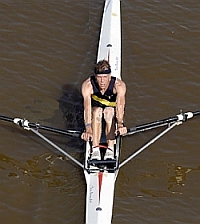
"Puff! This is hard. Whew! This is hard. Aargh! This is hard.
It looks so easy but it’s so very difficult. It requires physical strength, balance, rhythm and technique. And I don’t have enough of any of these things.
It takes place in a constantly changing environment of air and water. It can be spiritually rewarding and competitively driving. The objects it involves – boat, oars, oarlocks, etc – are beautiful examples of form following function, intelligent and technologically advanced. A 28 foot single scull weighs only 30 pounds.
And I can do it indoors, on my Concept II rowing machine, or outdoors, on the mighty Arkansas River, depending on the weather.
And so to a well-earned rest
Sculling gives me moments of true ecstasy and gratitude for my existence. But that doesn’t mean it will do the same for you.
You must find your own way of manifesting your uniqueness in the physical world, your own way of glorying in the perfect encounter of mind, body and physical environment.
I wish you joy in your exploration and moments of bliss in your application.
Chris,
You do have the knack of making us confront those things we ordinarily shy away from. Somehow you do it with grace, so I don’t feel a total plonker for not exercising.
That said, I haven’t found an exercise that brings me the same pleasures that sculling does for you. Looking inside, I can’t understand why not. For sure the gym oriented “exercise” resembles torture. My favorite activity is rightly described as a pastime, although I think that grinders would beg to differ!
So what to do? I will occasionally ride my bike – nice trails here in the spring. But even that has to cope with my nemesis – boredom. And that is the crux of the matter, I somehow demand to be “entertained” the whole time. The “entertainment” has to be total.
Mmm. I do resonate with the boredom issue. Of course, you could pedal a unicycle or a penny-farthing (what would that be in US dollars?) Or perhaps there’s some sort of iPhone app that could somehow motivate you to exercise while presenting itself as a more cognitive challenge. Suppose it linked the GPS system into a treasure hunt for exotic spices? Is there money to be made . . . ?!
Hi Chris,
I walk my dog and do scouts pace 6running/6walking for part of it. We also organised a really long walk across England for 7 weeks which kept us well entertained and we were really fit at the end. Then we wrote a book about it. I like epic but its not a way to spend all my life or may be it is…
You are so right … I do 15 min of Pilates every morning and play tennis. My secret goal is to be able to do some acrobatics like walking on your hands and such (but it’s a long way). For me it’s really about having a goal that is stretch enough and that I really want. Tennis is a big challenge (I mean — a small fast object approaching you, your first impulse is to run away, sensibly, no?) and acrobatics is impossible but way way fun. Actually, maybe I should try and book a workshop on it … I just might be up to it. At least I could try …
Acrobatics? Of course. It’s super-challenging and demands balance, strength, flexibility – and a lot more physical courage than I think I could muster. And thank you for explaining why I was never much good at tennis!
I like dance, with plenty of ass-shaking, sweat, drama, and joy. I occasionally get choked up, dance is so much a part of being human, especially communal dance.
I like sculling too, and sweep rowing. Both require attention and total investment of self (which I lose and find and lose again). I love the river. It always feels to me like the mother of this place.
Weight lifting is gratifying, undertaken with creativity and care. I enjoy the fantasy of the comic book hero with proud stance and skimpy costume, able to leap tall buildings and lift them too, one handed.
Exercise doesn’t have to be serious business to be effective. We are animals, we need to play!
Just dropping by as a “gifted person” who is also a dedicated athlete (long distance runner). Why is it that people think physical and intellectual fitness are incompatible?
From the start of the post, ‘feel more present in our bodies and are able to add greater value and vitality to each moment’, it’s as if you’re reading my mind. I run and lift weights, and in turn have the pleasure of not thinking for a moment, instead just feeling the physical effort of moving those lumps of steel around or pushing my body along the footpath. Being someone who feels quite strange in his physical self, it’s the closest thing to ‘normal’ I can find – heightened awareness doesn’t seem like much of a gift at times. Plus there’s the the added benefits of endorphins and whatnot, and I can definitely attest to the idea of aerobic activity reducing stress or helping us physically, mentally and emotionally deal with it better – a good run can clear my mind, relax my body, and give me that boost I need to solve whatever issue I’m facing.
As for the waltz, as someone who has learnt Argentine tango, I’d be happy to dance for 60 minutes (despite my usual tendency to shy away from intimacy), as long as I have a good partner!
Gymnastics if challenging…especially in your late twenties, trains balance, you need strength, focus…or you land on your face!
In a class it’s fun, you get motivated by others success. If I’m in a mood, I just train in zen mode on the beam. Very rewarding :)